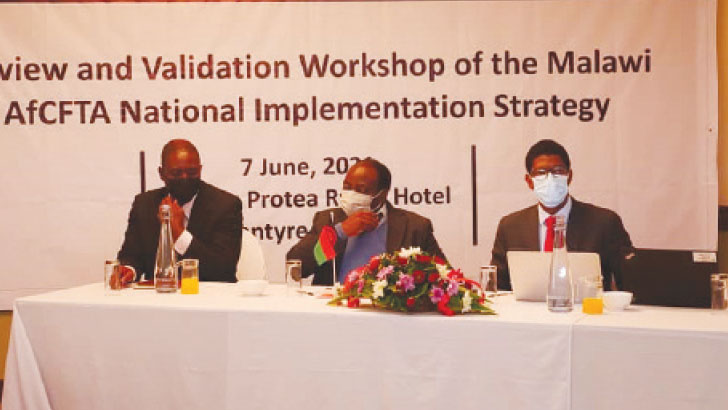MW ready to tap into K750bn African market
Malawi has potential to tap from a $943 million (K754 billion) export markets through the African Continental Free Trade Agreement (AfCFTA), Malawi AfCFTA National Strategy has shown.
The strategy seeks to support the effective implementation of the AfCFTA in Malawi to increase intra-African trade exports and build global trade networks by 2026.
The Malawi AfCFTA National Strategy also shows that through the continental trade agreement, Malawi has potential to expand its exports market outside the Common Market for East and Central Africa (Comesa) and the Southern Africa Development Community (Sadc).

during a validation workshop in Blnatyre
The potential market, according to the document, include Cote d’Ivoire with a market of $ 324.1 million, Nigeria ($ 97.7 million), Algeria ($ 95.8 million), Mali ($ 91.7 million), Morocco ($89.9 million), Ghana ($84.5 million), Gambia ($ 36.2 million), Senegal ($ 59.4 million) Benin ($50.1 million), and Sierra Leone ($ 14.6 million).
These markets, target export goods and services of tobacco, sugar, beverages (ethanol), oilseeds and pulses (mainly beans), cereals; rice, maize for seed, fish, coffee extracts, wood and wood products, plastic products, tourism, telecommunication services, insurance and financial services and business services; accountants and engineering services.
Reads the strategy in part: “The overall AfCFTA opportunities and Malawi’s strengths are the growing African populations and cities, comparative advantage in agriculture, selected services, and low minimum wage.
Malawi participation in the AfCFTA risks are mainly short-term revenue losses and some dynamic impacts on the structure of the economy.”
International Trade Centre (ITC) figures show that Malawi’s goods trade balance stood at $471 million (K377 billion) while services trade balance with the rest of the world was recorded at $ 105 000 in (K84 million).
One of the AfCFTA National Strategy consultant Pilirani Chuma observed that while there has been persistent negative trade balance in services trade from 2015 to 2019, efficient services are the foundation of success to trade in goods.
She said: “The AfCFTA has met with fertile efforts from the government to develop the service sector through targeted policies.
“Priority areas for the negotiations include business services [including professional services], communication services, financial services, tourism services and transport services.”
Ministry of Trade director of Trade Clement Kumbemba said without an efficient and focused network of trade support institutions working to make trade work for Malawi, the benefits of the AfCFTA may take too long to be realised.
“The strategy identifies lead and supporting institutions that will be critical in the implementation of the strategic objectives,” he said.
The AfCFTA is set to create the biggest free trade area in the World with a market of more than 1.2 billion people and a combined GDP of more than US$2.5 trillion.
Studies suggest that if successful, Africa’s manufacturing sector will double in size, with annual output increasing from $500 billion in 2015 to $1trillion in 2025, and contributing additional 14 million stable, well-paying jobs.





